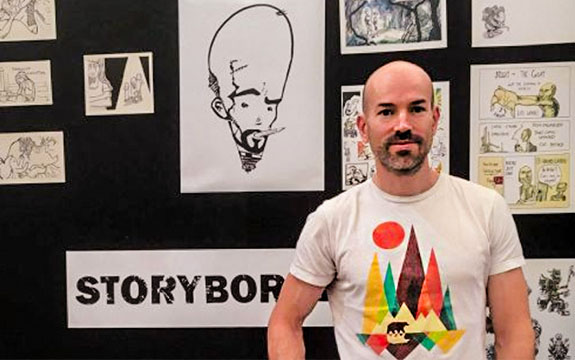
Dr Fisher’s research explores the autobiographical use of comics to understand what it means to be human.
Dr Darren C Fisher is looking to educate the public on the role of comics and the importance of creative practice during an ABC residency, beginning this week.
A lecturer in animation at Swinburne and an established comic artist, was named a recipient of the 2019 earlier this year.
He was chosen by the ABC and the University of Sydney from more than 150 applicants and will undertake a two-week residency at ABC RN, learning from journalists and broadcasters about how to communicate ideas and develop content across radio, television and online.
During the residency, Dr Fisher will create a daily diary comic as a unique way of documenting his experiences
View this post on Instagramon Sep 22, 2019 at 4:47am PDT
Dr Fisher’s work explores the autobiographical use of comics to understand what it means to be human.
“I’m looking forward to learning about the behind-the-scenes of radio broadcasting, while spreading the word on comics and personal storytelling,” he says.
“I’m hoping to produce a radio spot explaining how comics work. Explaining some of the accessible theory on how we read them and my thought processes on manipulation of the medium, the choice of art and language, the use of different techniques and styles, and so on.”
Dr Fisher also hopes to reach out to industry partners and marginalised groups through the platform.
“One immediate goal is a series of collaborations engaging industry partners and marginalised groups of society, hosting comic narrative workshops focusing on personal storytelling.
“I think the more we hear about other people’s stories, where they came from and how they came to be where they are, the more we can relate to others and hopefully build a little more empathy and connection across our communities.”
The power of comics
Dr Fisher has a , and his research explores the autobiographical use of comics to understand what it means to be human.
“Comics are the medium that I’ve always worked in primarily. I think they suit my personality as someone who enjoys quiet contemplation and getting into focused flow states,” he says.
Dr Fisher loves comics as a medium because there is an endless amount of complexity, while at the same time there’s a simplicity and informality to them.
“Anyone can grab a paper and pencil and start making comics, which is how I started as a child. It was just moments in boxes to begin with and it’s gotten more sophisticated over the years, but there’s still an immediacy and an accessibility to the work I produce.”
View this post on Instagramon Sep 12, 2019 at 12:25am PDT
Dr Fisher worked on with Swinburne’s Social Innovation Research Institute looking at the work of The Rural Outreach Program.
He hopes he can use his residency to draw attention to researchers like himself who do not fit the traditional mould.
“For a host of reasons, both historical and practical, research at the tertiary level is rooted in STEM structures such as peer reviewed publication through journal articles,” says Dr Fisher.
“I want to help spread awareness of creative practitioners, often called practice-based researchers, whose work doesn’t always conform to traditional research paradigms.”
A creative future
Looking to the future of academia and creative arts, Dr Fisher does see a growing recognition of creative practices.
“There is a growing acknowledgement that the future of our workplaces is going to rely on the type of adaptive and lateral thinking that is an embedded component of creative practice,” he says.
“I feel very lucky to have been able to study animation and then to focus on comics and illustration in honours and then doctoral studies. Although I do recognise that creative arts practice has a way to go within the context of academic institutions, I’m confident in the future.”








